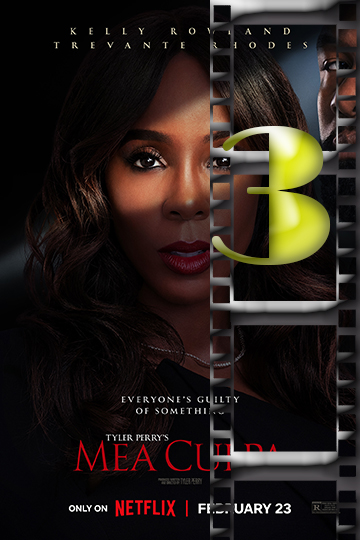

What’s It About
A criminal defense attorney takes on the case of a seductive artist accused of murdering his girlfriend, but when burning desire takes hold, things get hot — and dangerous.



MOVIESinMO REVIEW
Tyler Perry’s latest cinematic endeavor, Mea Culpa, emerges as a loud, steamy melodrama that dives deep into the extravagances of soap opera flair, showcasing Perry’s distinctive style when he steps out of Madea’s shadow. Set against the backdrop of Chicago’s elite, the film narrates the story of Mea Harper (Kelly Rowland), a sought-after defense attorney who finds herself entangled in a complex case with romantic and erotic undertones. Rowland, taking the lead, delivers a compelling performance as Mea, a woman trapped in a disheartening marriage to a once-promising medical specialist whose career and personal life spiral due to substance abuse and infidelity. His downfall is further complicated by his overbearing and spiteful mother, portrayed with exaggerated villainy by Kerry O’Malley, whose portrayal borders on the comical. The plot thickens when Mea is propositioned to defend the enigmatic artist Zyair Malloy (Trevante Rhodes), who is accused of a heinous crime. Despite Rhodes’ undeniable charisma, his talent seems underutilized in a narrative that teeters on the edge of believability. Mea’s professional dilemma is further strained by familial pressures, as taking on Malloy’s case means opposing her brother-in-law, the prosecuting attorney, adding layers of conflict and intrigue. Perry’s narrative ambitiously attempts to revive the glossy allure of the past. However, despite its stylish attempt to mimic these classics, the film struggles under the weight of a convoluted plot and stilted dialogue, which often leaves its talented cast grappling with the script’s more outlandish demands. The movie’s transition from an erotic thriller to a cumbersome relationship drama and finally to a bewildering climax filled with improbable twists showcases Perry’s knack for dramatic storytelling but also highlights a lack of coherence and subtlety. The film’s visual aesthetic pays homage to Perry’s penchant for showcasing African American affluence, with its cast donning chic attire amidst luxurious settings. Yet, this visual splendor is somewhat overshadowed by the narrative’s erratic pacing and overreliance on worn-out tropes and caricatured antagonists. Mea Culpa embodies Perry’s signature blend of melodrama and extravagance, yet its ambition to meld sultry thriller elements with soap opera excesses results in a disjointed viewing experience. While it offers moments of guilty pleasure and campy fun, the film ultimately reminds us of Perry’s uneven track record outside the Madea franchise. Despite its flaws, “Mea Culpa” provides a window into Perry’s creative vision, albeit one that could benefit from a more coherent and focused approach to storytelling.
OUR RATING – AN INSOMNIA CURING 3

